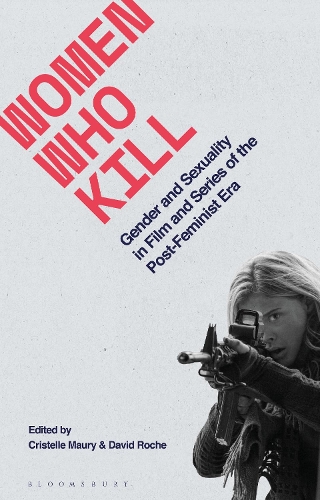
Women Who Kill: Gender and Sexuality in Film and Series of the Post-Feminist Era
(Paperback)
Available Formats
Publishing Details
Women Who Kill: Gender and Sexuality in Film and Series of the Post-Feminist Era
By (Author) Dr David Roche
Edited by Cristelle Maury
Bloomsbury Publishing PLC
Bloomsbury Academic
23rd September 2021
United Kingdom
Classifications
Tertiary Education
Non Fiction
Gender studies, gender groups
Sociology
Sex and sexuality, social aspects
Films, cinema
791.436556
Physical Properties
Paperback
368
Width 138mm, Height 214mm, Spine 22mm
460g
Description
Women Who Kill explores several lines of inquiry: the female murderer as a figure that destabilizes order; the tension between criminal and victim; the relationship between crime and expression (or the lack thereof); and the paradox whereby a crime can be both an act of destruction and a creative assertion of agency. In doing so, the contributors assess the influence of feminist, queer and gender studies on mainstream television and cinema, notably in the genres (film noir, horror, melodrama) that have received the most critical attention from this perspective. They also analyse the politics of representation by considering these works of fiction in their contexts and addressing some of the ambiguities raised by postfeminism. The book is structured in three parts: Neo-femmes Fatales; Action Babes and Monstrous Women. Films and series examined include White Men Are Cracking Up (1994); Hit & Miss (2012); Gone Girl (2014); Terminator (1984); The Walking Dead (2010); Mad Max: Fury Road (2015); Contagion (2011) and Ex Machina (2015) among others.
Author Bio
David Roche is Professor of Film Studies at Universit Paul Valry Montpellier 3, France and President of SERCIA. He is the author of Quentin Tarantino: Poetics and Politics of Cinematic Metafiction (2018) and Making and Remaking Horror in the 1970s and 2000s (2014), and has edited several books, including Comics and Adaptation (2018, with Benot Mitaine and Isabelle Schmitt-Pitiot), Steven Spielberg, Hollywood Humanist & Wunderkind (2018) and Intimacy in Cinema (2014, with Isabelle Schmitt-Pitiot). Cristelle Maury is Associate Professor at Universit Toulouse Jean Jaurs, France. She has published many articles on classical film noir and on the relationships between feminist film criticism and films. She has co-edited three issues of Miranda, on new forms of adaptations, on circulations and transfers in film, and on mapping gender.
